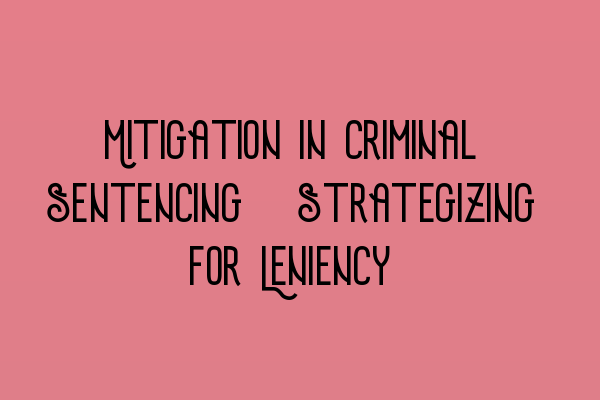Mitigation in Criminal Sentencing: Strategizing for Leniency
When it comes to criminal sentencing, the role of mitigation should not be underestimated. Mitigation refers to the process of presenting factors that can potentially reduce the severity of a sentence. This can make a significant difference in the outcome of a case, leading to more lenient penalties for the defendant.
In the criminal justice system, judges have discretion in determining the appropriate sentence for an offender. While they must consider the seriousness of the offense and the need to protect the public, they also take into account any mitigating factors presented by the defense.
What are mitigating factors?
Mitigating factors are circumstances or characteristics of the offender or the offense that, if presented effectively, can result in a more favorable sentence. These factors can include:
- The offender’s age
- The offender’s mental health or cognitive impairment
- The offender’s lack of prior convictions
- Any remorse or restitution made by the offender
By highlighting these mitigating factors, the defense can persuade the judge to consider a less severe penalty for the defendant.
Strategizing for Leniency
Developing a strong mitigation strategy requires careful planning and execution. Here are some key steps to consider:
- Assess the case: Thoroughly review the details of the case to identify potential mitigating factors. This may involve consulting with the defendant, gathering relevant evidence, and researching case precedents.
- Work with the defendant: Understand the defendant’s background, personal circumstances, and any factors that may contribute to their actions. This can help in crafting a compelling narrative tailored to the individual.
- Collaborate with experts: When necessary, consult with professionals such as psychologists, social workers, or addiction specialists who can provide valuable insights into the offender’s situation. Their expert opinions can strengthen the mitigation argument.
- Prepare persuasive documents: Present the mitigating factors in a clear and concise manner. This may involve drafting a mitigation statement, compiling character references, and gathering supporting evidence.
- Present during sentencing: Be present during the sentencing hearing to advocate for the defendant and effectively present the mitigation strategy. This includes articulating the case for leniency and countering any opposing arguments.
To maximize your chances of success, it is crucial to work with experienced criminal defense solicitors who understand the complexities of criminal sentencing and have a proven track record in developing effective mitigation strategies.
Conclusion
Mitigation plays a vital role in criminal sentencing, allowing individuals to present relevant factors that can lead to more lenient penalties. By carefully strategizing and presenting mitigating factors, defendants increase their chances of receiving fair and proportionate sentences.
